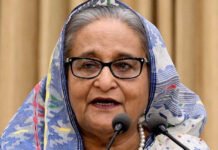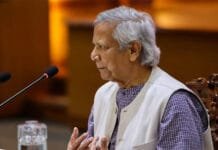INVC NEWS
Dhaka : The plight of Hindu minorities in Bangladesh has escalated into a severe crisis. Facing persistent attacks and discrimination, Hindu communities are now encountering a new, alarming trend: forced resignations from government positions. This troubling development has surfaced with a stark revelation from the Bangladesh Chhatra Aikya Parishad, the student organization affiliated with the Bangladesh Hindu Buddhist Christian Aikya Parishad. Since August 5, approximately 50 Hindu academics have been coerced into resigning from their governmental roles, reflecting a deepening crisis that extends beyond mere harassment to outright systemic oppression.
A Closer Look at the Crisis
Systematic Attacks and Forced Resignations
The Hindu minority in Bangladesh has long been subjected to a series of violent attacks and social discrimination. Recent reports indicate that the situation has deteriorated significantly, with government employees—specifically in academic positions—being targeted for forced resignation. Among the most notable cases is that of Shukla Roy, the principal of Government Bakarganj College. Roy’s resignation was not only coerced but also executed under duress, as evidenced by a photograph showing him signing a plain piece of paper with a terse note, “I resign.”
This act of coercion is not isolated. Many Hindu educators, including professors and lecturers, have reported similar experiences. Sanjay Kumar Mukherjee, Associate Professor at the Department of Public Administration and Governance Studies, Kazi Nazrul University, Bangladesh, revealed his own ordeal. Mukherjee was compelled to resign from his posts as Proctor and Head of Department under duress, expressing profound insecurity and fear for his safety.
Witness Testimonies: Voices from the Ground
The accounts from those directly affected underscore the gravity of the situation. Taslima Nasreen, a renowned writer and exile from Bangladesh, has voiced her grave concerns on X (formerly Twitter). She describes a dire environment where not only are teachers being forced to resign, but journalists, ministers, and former government officials are also being subjected to brutal harassment, beatings, and imprisonment. Nasreen’s commentary sheds light on the widespread nature of the oppression facing Hindu minorities in Bangladesh.
Impact on Educational Institutions and Governance
Disruption in Academic Institutions
The forced resignation of Hindu academics has far-reaching implications for Bangladesh’s educational institutions. The sudden departure of experienced faculty members disrupts the academic environment, affecting the quality of education and institutional stability. This crisis not only undermines the educational system but also sends a chilling message about the security and autonomy of academic professionals belonging to minority communities.
Governance and Administrative Challenges
The forced exodus of Hindu officials from government roles also poses significant challenges for governance and administration. These resignations create gaps in the administrative structure, impacting the efficiency of governmental functions and services. The systemic removal of Hindu professionals from these positions raises concerns about the inclusivity and fairness of governmental operations, further exacerbating the crisis faced by minority communities.
The Broader Implications: A Crisis of Human Rights
Human Rights Violations
The ongoing attacks and forced resignations highlight severe human rights violations in Bangladesh. The systematic persecution of Hindu minorities not only contravenes fundamental human rights but also undermines principles of equality and justice. The international community must take note of these violations and advocate for measures to protect minority rights and uphold democratic values.
International Reactions and Responsibilities
The international response to these human rights abuses has been varied, but there is a growing call for action from global human rights organizations. The situation in Bangladesh demands a concerted effort from international bodies, including the United Nations and other human rights organizations, to apply diplomatic pressure on the Bangladeshi government. It is essential to support initiatives that promote justice and safeguard the rights of all citizens, irrespective of their religious or ethnic backgrounds.
Calls for Action: What Can Be Done?
Advocacy and Support
There is a critical need for advocacy to address the plight of Hindu minorities in Bangladesh. Support from international human rights organizations, along with pressure from global governments, can play a crucial role in addressing these issues. Advocates must work to raise awareness about the situation, support affected individuals, and push for international intervention.
Policy and Reform
Policy reforms within Bangladesh are essential to address and rectify the injustices faced by minority communities. The government must be held accountable for ensuring the safety and rights of all its citizens. Implementing protective measures and promoting inclusive policies can help in mitigating the crisis and restoring faith in the country’s governance and justice systems.
The Urgent Need for Global Attention
The international community must act swiftly to address these issues, ensuring that human rights are upheld and that justice prevails. As the situation continues to unfold, it is imperative that global leaders, human rights advocates, and the international community stand united in their efforts to support the affected individuals and push for meaningful change in Bangladesh.
















